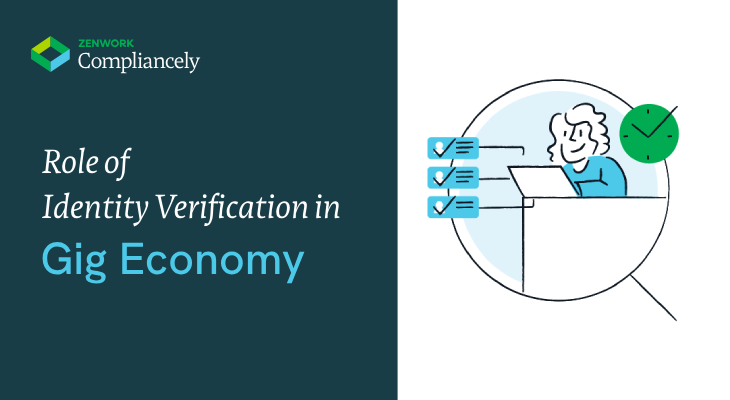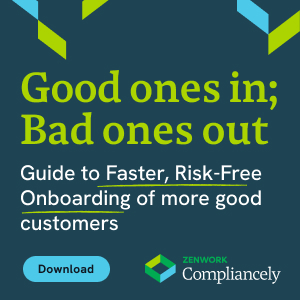Role of Identity Verification in Gig Economy

The gig economy is one of the biggest revenue-generating sectors for the U.S economy. Over 36% of the entire U.S. workforce (more than 50 million American workers) either primarily or secondarily contributes to the gig economy (1, 2).
As the employment workforce is seeing a 7% dip after the outbreak (1) and the gig economy growth rate is now accelerated by 3X its regular growth rate, there is an increased need to be compliant.
Now, you may ask why these stats matter. So, here’s why.
The Significance Of Identity Validation In The 2021 Gig Economy
The gig economy is dependent on independent contractors. When the number of vendors you hire increases, so does the tax liability and the reporting responsibility. It is no secret that the IRS has increased its focus on the gig economy and wants all the workers and platforms to comply with it (1, 2).
The pressure is pretty high. No company is prepared to be penalized in this economy. Identity validation is the much-needed compliance strategy, which will curb the malpractices within the gig economy.
Issues such as the non-inclusion of employees in payroll, false positives, unidentified independent contractor payments, non-transparent “private” or personal payment reports, and other non-compliance activities will no longer find a loop.
The IRS is hoping to stabilize an ecosystem that is used to negligence and non-compliance.
What Identity Validation Means for Gig Economy
Yes, identity verification processes will accelerate tax and business compliance. But the picture is much bigger than this.
A verified vendor means transparency. A hiring business will be able to validate if the vendor has been in business long enough to take on complex projects. It will also allow businesses to verify the TIN/Name combination per the authorized IRS records. This helps businesses add verified vendors to their master vendor lists.
Further, businesses can uncover any murky financial history or security noncompliance records of the contractor, making way for a healthy business ecosystem.
The same logic applies to business verification. Independent contractors will be able to validate if the business they would be associating with is legit. The tax compliance history, business compliance, financial records, and other aspects can be assessed thoroughly before the contractor or the vendor signs an agreement with the business.
The independent contractor will also be able to verify the EIN/Name combination of the associating business per the IRS records. This way, the contractor can request W-9s and other paperwork as required.
How Identity Validation Translates To Healthier Business Ecosystem
When both parties in a transaction can verify each other’s tax history, business records, and other vital information, both parties can work together in consensus for the longer run, which would stabilise the contractor-client relationship.
While healthy competition is the most fundamental driving factor in the gig economy, establishing stability would bring consistency and permanency to the ecosystem as a whole.
Identity verification is the only way forward for the gig economy.
Determine If Your Business Needs To Integrate Identity Verification
If you have more than a handful of vendors who work for you periodically, then you must integrate some type of identity verification practice to smoothen things out for your business.
Every business that works with a freelancer, an independent contractor, or a vendor has to send Form W-9s to their vendors to fill in. Every business that compensates an independent contractor is also required to file Form 1099-NEC with the IRS and send a copy of the same to the vendor.
But to do either of these things, you need some information from your vendors, such as their tax identification number, business name, and other information to report in the IRS returns.
However, when you do not have this information by your side (because you did not think this information would be important when you hired the said vendor), your business has to pay the price for non-compliance. And those non-filing penalties are pretty pocket-burning.
And the simple solution to all this chaos is identity verification.
How Identity Verification Brings Stability To Your Gig Economy Business
- A simple verification check would allow you to validate if the vendor is legit and exists in the IRS records. When you add verified vendors to your vendor lists at the beginning of the ordeal, you’re saving yourself (and your accounting teams) from the year-end rush to meet the deadline and file the required IRS returns (with accuracy).
- Not all businesses depend on vendors. Some gig economy companies choose to employ their workers permanently. In such a case, identity verification helps you accelerate and streamline your payroll operations.
- Businesses within the insurance and banking industries heavily depend on profile verifications to approve loans, credit cards, reimbursements, and other financials. A smart identity verification system would allow you to increase your approval rates and avoid false positives.
- Transparency is the biggest advantage of integrating identity verification for your business. Every single transaction is reported and accounted for, leaving no room for corrupt practices.
- Identity verification allows you to audit your financials and tax records to identify and track certain payments and incomes and maintain transparent audit records.
- Identity verification allows you to comply and stay compliant as long as you want to be in business.
Compliancely – The Real-Time Identity Verification Infrastructure
Do you find yourself making hefty payments to freelancers and vendors only for them to provide inconsistent or wrongful business information when it’s finally your time to file the IRS returns?
This can be avoided when you have a strong, authorized identity verification infrastructure like Compliancely by your side before you sign into the ordeal.
If you already have made payments to the vendor, don’t worry. Compliancely will help you determine if a vendor needs to be on your vendor list at all.
Enter the vendor’s EIN or TIN along with their business name, and you will be able to figure if they are what they claim to be – compliant. Protect your business from associations that could damage your reputation and bring in a nightmare of hefty penalties from the IRS.
Compliancely is not just for ensuring tax compliance. You will also be able to verify an individual or an entity against the following databases and validate them per the security compliance protocols.
- Internal Revenue Service
- IRS Tax-Exempt Org. Search
- Specially Designated Nationals
- FATCA List
- European Sanctions List
- Address Validation
- Denied person List
- Politically Exposed People
- Death Master File
- OFAC Watch List
- SOS Business Entity Search
- Consolidated Sanctions
- Arms Export Control Act
- Foreign Sanctions Evaders List
- Excluded Parties List System
- Excluded Individuals and Entities
- Designated Foreign Terrorist Organizations
Check an individual or entity’s real identity in real-time with Compliancely.
